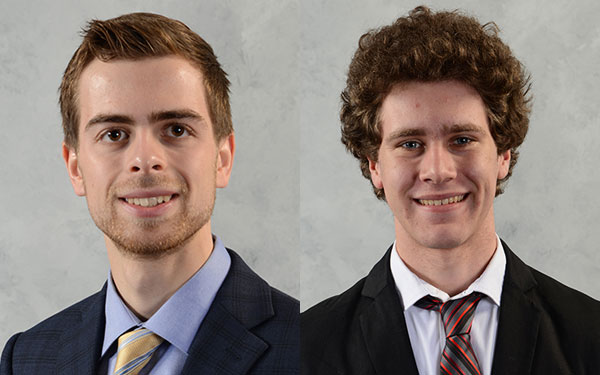
Students: Jesse Galloway & Matthew West
Project: Smart Traffic
View: Research Poster (PDF)
Institution: Lehigh University
Major: Computer Science & Engineering
Advisors: Mike Spear, Mark Erle
Abstract
Due to the high volume of cars traveling on the road every day, traffic is a phenomenon that many people are familiar with. Traffic can specifically cluster at intersections and cause unnecessary wait times for drivers. In this project, our group aims to alleviate the delays caused by traffic, defined here as the amount of time cars spend at intersections. Our solution decreases traffic wait times by leveraging machine learning and advanced algorithms to reduce traffic intersection congestion. The system operates in three phases: detection, tracking, and decision making. During the detection phase we use object classification to identify new vehicles entering the intersection. In the tracking phase every frame is analysed and we use an object tracking algorithm to record updated positions and velocities for each vehicle. During the decision making phase the data from the previous two phases is combined. Using this data and the intersection layout we make intelligent decisions to control traffic efficiently. Together this software based system has the capability to improve traffic throughput of any standalone intersection when compared to traditional traffic control techniques.
About Jesse Galloway
Jesse Galloway is a Senior at Lehigh University studying Computer Science. He has a background in system programming and has studied a variety of fields at Lehigh including databases, parallel systems, AI, and machine learning. The latter two were used in this project to automatically identify and track vehicles. Jesse will graduate this spring and has accepted a position as a software engineer for Aurora Flight Sciences, an autonomous drone research organization, based in Boston, MA.
About Matthew West
Matthew West is a Senior at Lehigh University currently pursuing a BS in Computer Science and a BA in Biology. While at Lehigh, he has studied various computing topics such as databases, structural bioinformatics, and AI in addition to various biological concepts such as biochemistry, genetics, and neuroscience. In this project, Matthew used AI to track vehicles at intersections. Beyond academics, Matthew volunteers as an EMT with LUEMS. Matthew will graduate in May 2020 with both degrees and plans to pursue a master’s degree in computer science afterwards.
